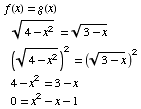Calculus I Quiz #1 September 10, 2004
Name____________________ R. Hammack Score ______
_________________________________________________________________
The problems on this quiz involve the functions
(1) Find the value(s) of x for which
The answers to this question are the solutions of the equation

Since this quadratic doesn't easily factor, we use the quadraitic formula.
Thus
(2) Find the domain of the function f.
Since we can't have a negaitve value inside the square root, we insist that
-2 2
----+--------+-----
- - -| + + + | + + + (2+x)
+ + | + + + | - - - - - (2-x)
- - - | + + + | - - - - - (2+x)(2-x)
Thus, you can see that the domain is the set [-2, 2].
(3) Suppose
(a)
(b)